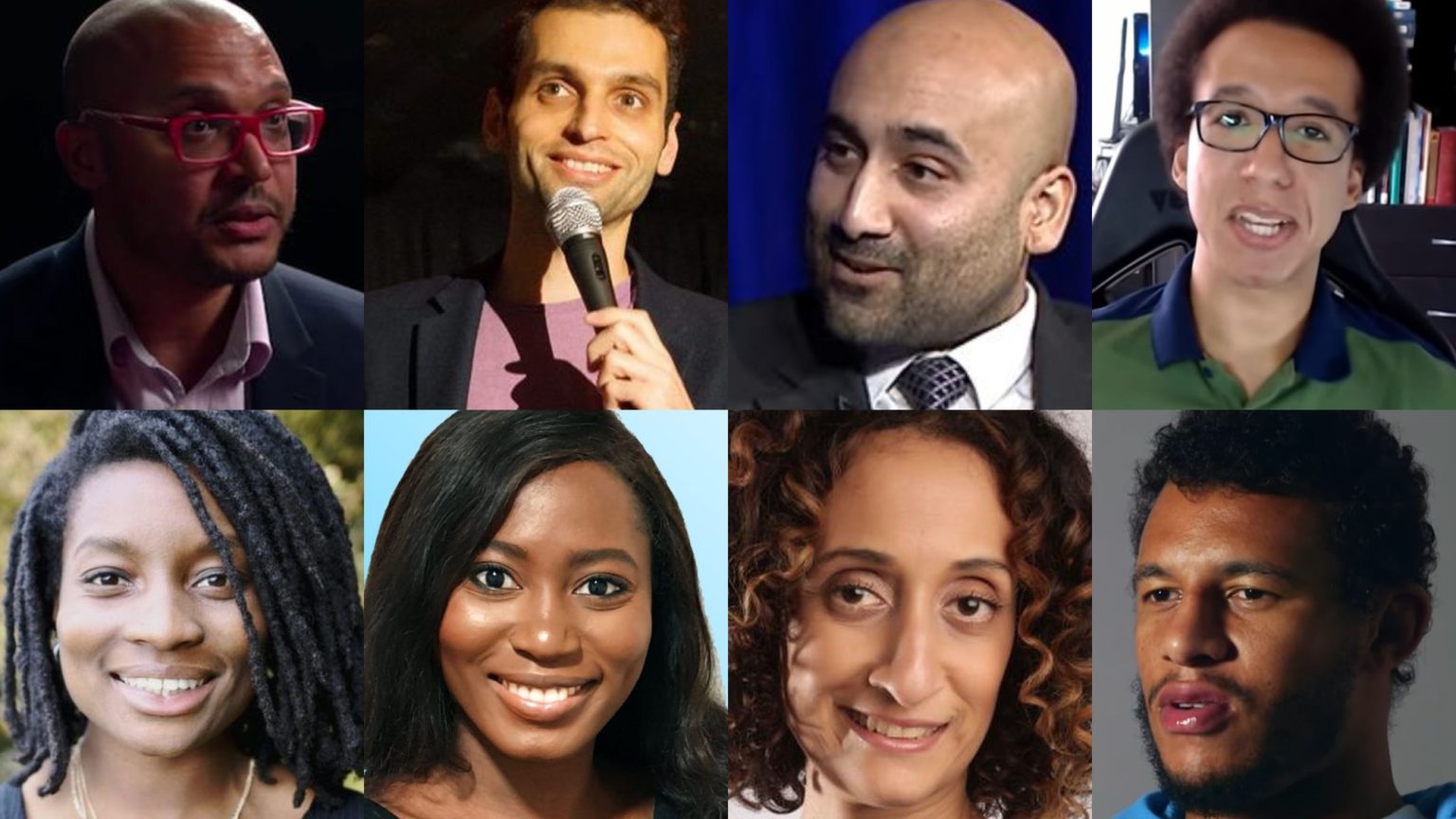Black Lives Matter does not own ethnic minorities
Eight reasons why BLM does more harm than good.

Want to read spiked ad-free? Become a spiked supporter.
In the wake of the killing of George Floyd and the Black Lives Matter movement, debates about race and racism have intensified. Events in the US have inspired calls across the West to ‘decolonise the curriculum’, ‘defund the police’ and address perceived white privilege. But is today’s anti-racism, under the banner of Black Lives Matter, likely to lead to positive outcomes, or will it in fact harden divisions?

We have replaced one form of racism with another, says Inaya Folarin Iman
Anti-racist activists are using the same tactics as traditional racists. They suggest that ethnic-minority citizens cannot come to their own conclusions, independent of manipulation from the so-called white mainstream. The suggestion is that if individuals from ethnic-minority groups do not think the way that certain figures of the same ethnicity think they should, then they are somehow merely ‘tokens’, inauthentic, or brainwashed. The worldview presented here is that Britain’s ethnic-minority population has distinct – even opposite – interests to wider British society, and must advocate for their race-based interests in a way that does not enable all to think freely for themselves.
Despite recent attempts by several modern anti-racist activists to redefine racism to mean potentially anything and everything, the definition of racism remains the same. Racism is about discriminating against someone on the grounds of their real (or perceived) race, the belief that certain races are inferior or superior, and the expression of racist bigotry towards another person solely because of their skin colour.
A silver lining is that these activists have been clear about how they view the organisation of society. Now that the tolerant and open-minded mainstream is aware of their prejudicial views and ideas, the sensible majority must work against allowing the toxic forces of identitarian leftism to define the boundaries of public debate.
Inaya is a spiked columnist and founder of the Equiano Project.

BLM treats black people as permanent victims, says Esther Krakue
What I find most telling is the internalised racism that this movement has exposed. Many non-white ethnic groups have become so sensitive to the notion of ‘white privilege’ that I, as a black conservative, cannot be free to hold the views that I do without being accused of pandering to white individuals. The concept of ‘white privilege’, which stipulates an inherent inferiority and disadvantage to non-white people, is one that has become a staple in current discussions of race relations. How do we tackle racism if we, as a society, entertain an ideology that marks you as permanently disadvantaged because of such arbitrary physical characteristics? If I am always going to be at a disadvantage for not being white, where does the conversation go from there? There is simply no path for recourse.
It is this toxic idea that has stifled the progress of race relations in the UK over the years. And unfortunately, these notions have become magnified and widespread in the wake of BLM UK’s newfound notoriety.
Esther is a writer and commentator.

We must stop replaying the battles of the past, says Courtney Lawes
The fight against racism is an important one – and it is a fight that British society was winning. Speaking from my own experiences, as well as those of my Jamaican father, the country seemed to have become considerably less racist in a very short amount of time and looked very much like it would continue to be so. This was perhaps best encapsulated by the virtual disappearance of the far-right British National Party from politics. The Conservative Party has come a long way since Enoch Powell’s notorious ‘Rivers of Blood’ speech back in April 1968 – it now has a number of high-profile, non-white politicians of South Asian and West African origin.
Having said that, it is understandable why many black citizens continue to feel a sense of injustice. Being concentrated in the lower socio-economic classes in a market-based society can be spiritually demoralising for many from ethnic-minority backgrounds. However, this is where I think we missed a beat. Instead of merely rehashing anti-racism arguments that were already being won, it would have been far better to look inward to identify problems that need to be addressed; to try and help people to recognise the opportunities presented by virtue of living in Britain.
In my opinion, a better way to go about change would be to empower, encourage and inspire people to make good of themselves in their own country.
Courtney is an England rugby player and senior consultant to the Centre for Social Justice.

Black history is British history, says Katharine Birbalsingh
The BLM UK movement, along with ideologically aligned initiatives such as The Black Curriculum, demand the ‘decolonisation’ of the school curriculum in the UK. I believe they are motivated by decent intentions. These anti-racism advocates think that if children do not ‘see themselves’ in history, they will not succeed. This is based on the perception that the teaching of history in British schools is exclusively focused on white individuals – with influential black historical figures supposedly sidelined by the existing curriculum.
But this could not be further from the truth. The existing history curriculum features a number of influential black figures – in both the UK and beyond. It includes inspirational black icons such as Mary Seacole, the British-Jamaican businesswoman who set up the famous British Hotel which tended to the wounded during the Crimean War. It also includes US civil-rights activist Rosa Parks, who is primarily known for her pivotal role in the 1955 Montgomery Bus Boycott which took place in the southern US state of Alabama. In the current curriculum, the non-violent methods of protest supported by Indian anti-colonialist and political ethicist Mohandas K Gandhi are covered – the very methods later supported by US civil-rights leader Martin Luther King Jr.
Regardless, there is no enforced history curriculum. Apart from the Holocaust, teachers are not under a statutory obligation to teach any of these specific topics – instead they are guiding suggestions.
Even more crucially, putting something on the curriculum does not guarantee that students will learn it. As the assessment guru Dylan Wiliam says, if students learned everything we taught them, there would be no need for assessment.
Katharine is headmistress and co-founder of the Michaela Community School in Wembley.

We must end the bigotry of low expectations, says Calvin Robinson
In my experience as a state-school leader, teachers often set lower standards for students of colour in order to give them a better chance, presumably by helping them overcome what they perceive to be a handicap. For example, a teacher may overlook incomplete or missing homework if a child is from a particular racial background. What in theory is a well-intentioned action turns out to be detrimental to the teaching and learning of the young people involved.
Evidence suggests that BAME pupils prosper when expectations are raised rather than lowered. Young people thrive on boundaries and high standards, as is evidenced by schools like the Michaela Community School in London: with high proportions of BAME students and an emphasis on strong discipline, the school has achieved GCSE results four times above the national average.
Data from the Department for Education shows the temporary exclusion rates of Black Caribbean pupils to be at 10.5 per cent, with Black African children being much lower at 4.1 per cent, and White British pupils at 5.7 per cent. Clearly, this is not a black-and-white race issue; there are more socio-economic factors at play. An independent review into school exclusions in May 2019 found matching results. The exclusion rate of Chinese pupils was the lowest, at 0.5 per cent, with Irish Travellers being the highest, at 17.4 per cent. To suggest that the English education system is institutionally racist towards BAME pupils, in general, is a falsehood.
Calvin is a secondary-school teacher and consultant for the Department for Education.

Identity politics is fuelling anti-Semitism, says Konstantin Kisin
The extent to which our media and political landscape has been infected with an anti-Semitic mindset was laid bare during Jeremy Corbyn’s leadership of the Labour Party. Under his watch, the party was embroiled in an endless stream of allegations and resignations of prominent Jewish MPs and members. Over 85 per cent of British Jews believed the Labour Party was anti-Semitic, with an even higher percentage viewing Corbyn himself as an anti-Semite.
Having never met Mr Corbyn, I would not like to speculate too much over his views. But the cynic in me thinks that, if Labour had witnessed the loss of black MPs as a result of concerns over anti-black racism in the party in the same way they lost Jewish MPs from the Labour Party over anti-Semitism concerns, the reaction would have been very different from certain quarters. I suspect that the trivialisation of anti-Semitism-related grievances among pro-Corbyn activists would not be replicated by such actors in the event of allegations of institutionalised anti-black racism within the Labour Party.
The truth about identity politics, such as the type peddled by movements like BLM UK, is that it inevitably drives different ethnic and racial groups into conflict and competition. Instead of teaching us how to recognise our common humanity so we can live together in harmony as friends and neighbours, the point is to antagonise and agitate ordinary people into viewing each other as enemies, in an endless struggle for power.
Konstantin is a comedian and the co-host of Triggernometry.

White guilt is not a winning strategy, says Remi Adekoya
The question is not whether Britain should be made a fairer society for all (including black people), but rather what strategy offers the best probability of achieving that goal. Martin Luther King Jr is chiefly remembered today for his non-violent stance against racism. But King was not just a moralist – he was also a savvy strategist. He knew the demographics of America were stark: whites outnumbered blacks by more than eight to one at the time.
For this reason, he criticised the ‘fiery, demagogic oratory’ of black radicals, stressing African-Americans had ‘no rational alternative to non-violence’.
Of course, no one is calling for violent revolution today. But a strong part of BLM’s appeal for young minorities and blacks is likely its highly assertive language, which plausibly gives black people a desired feeling of agency and power. But assertive rhetoric does not equal material power. In reality, nothing can be achieved in the fight against racism in Britain without the overwhelming support of the 85 per cent white majority. The question is how to win over that majority. Suggesting they are inherently racist and should feel more or less perpetual guilt for slavery, colonialism and all the problems black people have today is unlikely to be a winning strategy.
Remi is a writer and political scientist at the University of York.

We need to champion social integration, says Rakib Ehsan
In order for Britain to make further progress in strengthening community relations and improving collective satisfaction with the democratic system, it is important that radical ideologues do not seize control of race-related narratives. While there is much room for improvement in developing a more meritocratic society where the impact of racial discrimination is reduced, Britain remains one of the most successful examples of a post-Second World War multi-racial democracy.
The need for nuance in debates over racial inequalities and discrimination is crucial, and there must be an effort by politicians and policymakers alike to guard against reductive analyses in this policy space. Racial and ethnic penalties continue to plague the British labour market. People of black Caribbean origin continue to face levels of discrimination not too different to those in the 1960s. There is some way to go in terms of ensuring a merit-driven allocation of opportunities and rewards. However, debates over racial and ethnic inequalities also ought to consider the centrality of a stable family unit, problematic internal cultural norms, and cultural barriers to social integration.
Rakib is a spiked columnist and research fellow at the Henry Jackson Society’s Centre on Radicalisation and Terrorism.
These excerpts are taken from Black Lives Matter UK: An Anthology, published by the Henry Jackson Society. You can read it in full here.
Pictures by: YouTube, Triggernometry Podcast.
Who funds spiked? You do
We are funded by you. And in this era of cancel culture and advertiser boycotts, we rely on your donations more than ever. Seventy per cent of our revenue comes from our readers’ donations – the vast majority giving just £5 per month. If you make a regular donation – of £5 a month or £50 a year – you can become a and enjoy:
–Ad-free reading
–Exclusive events
–Access to our comments section
It’s the best way to keep spiked going – and growing. Thank you!






Comments
Want to join the conversation?
Only spiked supporters and patrons, who donate regularly to us, can comment on our articles.